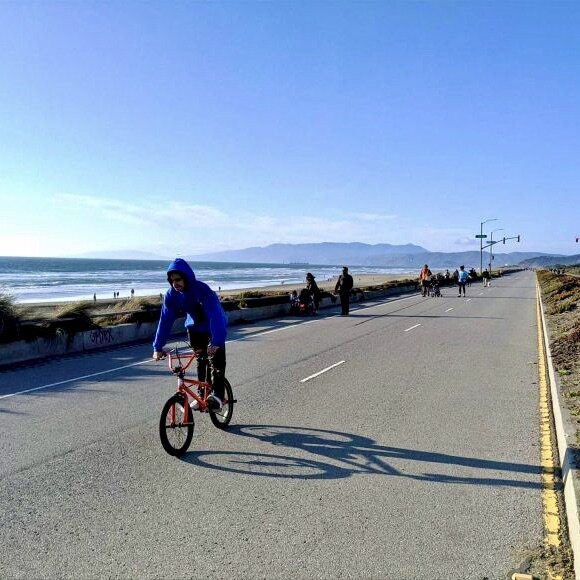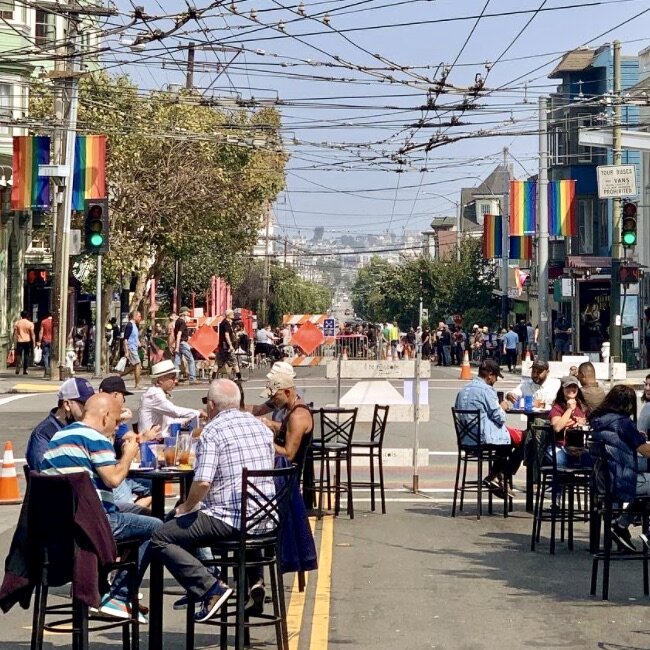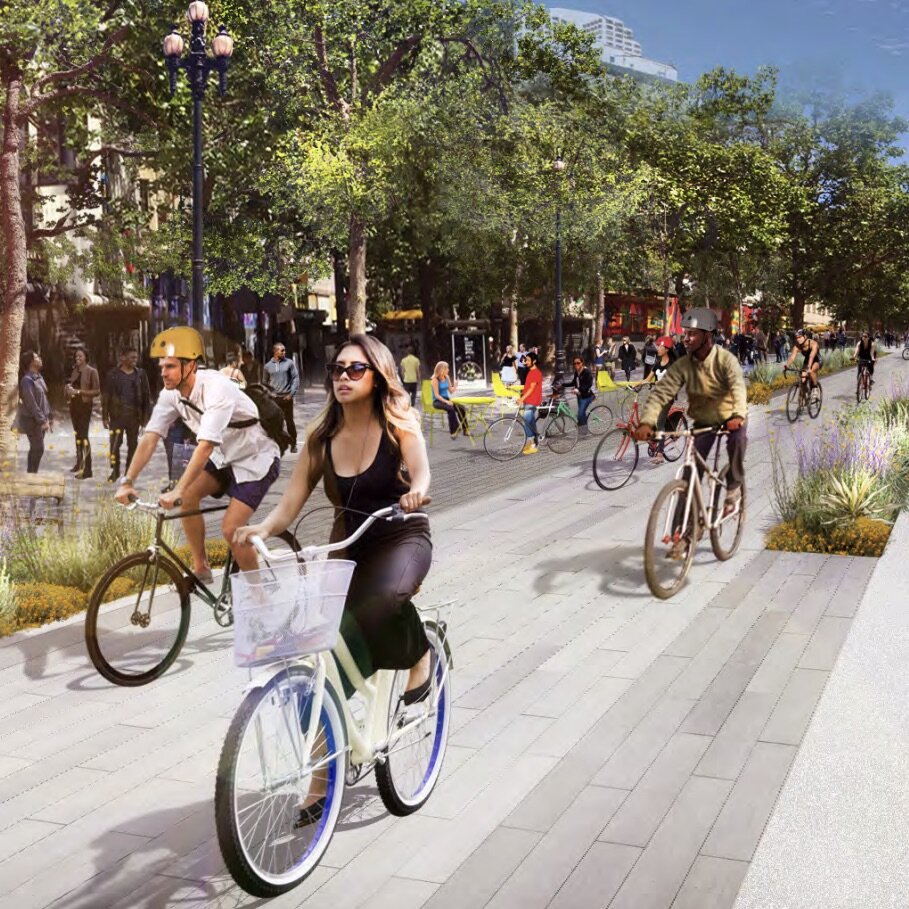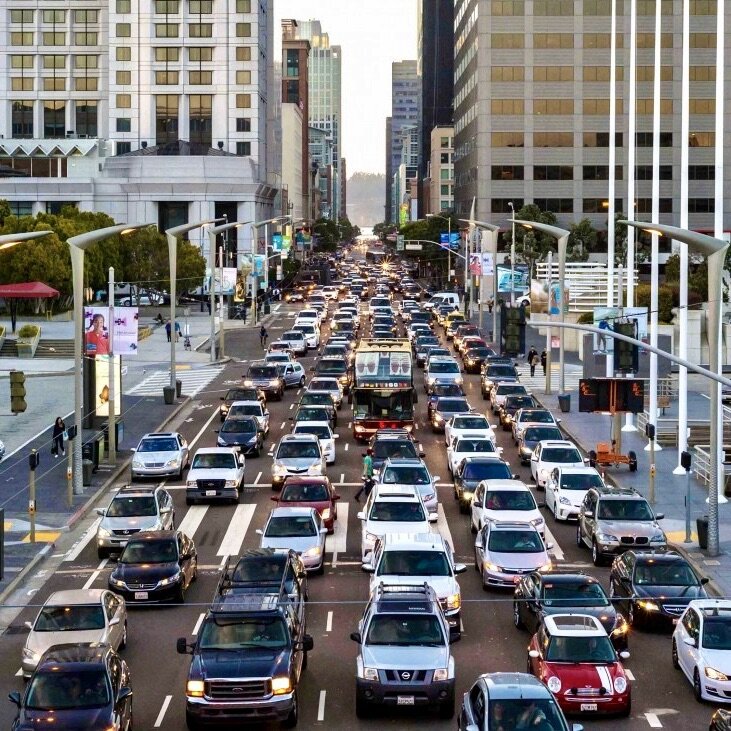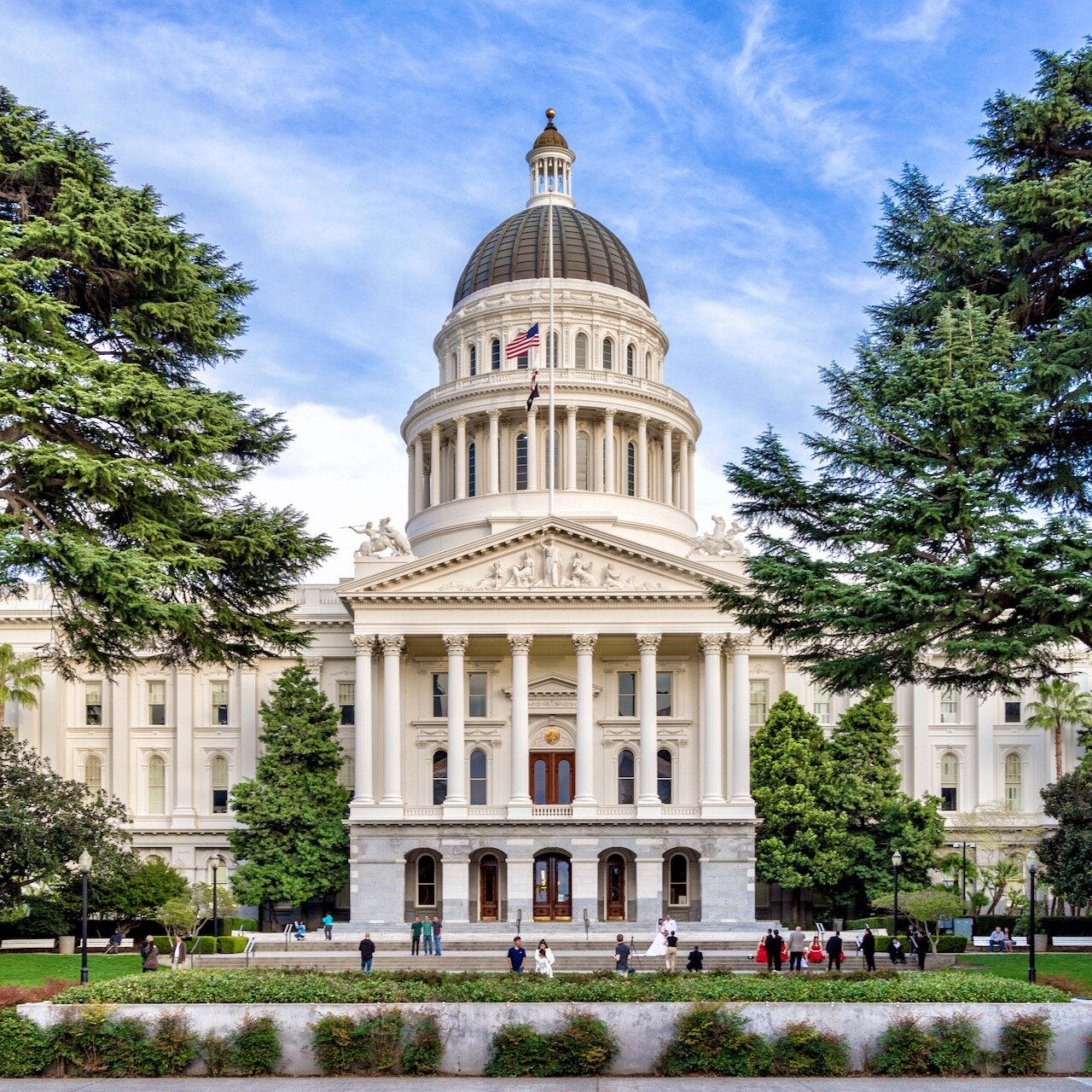
Campaigns
CAR-FREE SPACES
Photo: Streetsblog SF
The pandemic has created the opportunity for a complete re-envisioning of our public space. Our city has stepped up to the need for outdoor recreation with space for social distancing by reclaiming street space from cars and dedicating it for people to enjoying on foot or bicycle. It's a wonder to see families playing in streets that used to be the domain of motor vehicles and are now bustling with people.
There is now a six mile car-free route from the eastern end of the Panhandle all the way through Golden Gate Park to Ocean Beach, and then all the way down the Great Highway - now the Great Walkway! - to the zoo. There are also car free streets on Twin Peaks, and in McLaren Park, Heron's Head Park, and the Presidio.
We want to see theses streets permanently converted into car-free spaces, so that people can continue to enjoy them once the pandemic is over.
SLOW STREETS
Photo: Jon Bate
As well as car-free streets, another strategy the city has used to create spaces for people to exercise and play is limiting certain streets to local access and forcing vehicles to slow down. These Slow Streets have in many case become loved by their communities, with people adding decorations to the signs, bringing furniture out into the street to create an outdoor communal living room, and creating street art on the canvas of the roadway. They can be found all over the city, with Page St, Sanchez St, and Lake St being particularly vibrant examples.
We want to see theses streets permanently converted into slow streets, with physical traffic calming measures installed. While we are excited by the Slow Streets program, we are also concerned that the dense residential areas in the northeast corner of San Francisco are not getting the same consideration as the rest of the city, and want to see the program expanded into those neighborhoods.
SHARED SPACES
Photo: SFMTA
Our small businesses are struggling to survive during this pandemic. The Shared Spaces program allowed small businesses to convert over 1500 parking spaces into outdoor dining spaces and close 100+ streets all- or part-time to vehicle traffic. Popular shared spaces on Valencia St, Hayes St, and Grant Ave have shown that pedestrianized spaces are more effective than car traffic at bringing customers to businesses.
We campaigned to save shared spaces and make them permanent after the pandemic, with appropriate considerations made for cyclists, transit riders, and people with disabilities. We also would like to see more opportunities for people to sit and enjoy car-free spaces without having to purchase something. Car-free space should be available to all, not just those who can afford to pay.
Make Transit Accessible For All
Photo: SFMTA
San Francisco's Transit-First Policy promises to prioritize transit over cars; however this principle isn't always put into action. All over the city cars are allowed to park in front of bus stops, forcing passengers to squeeze between vehicles to get to the bus, and making it difficult for disabled passengers to board. On our light rail lines there are often gaps of up to a mile between accessible stops, and passengers often have to board trains from the traffic lane as there is no platform next to the tracks for them to use.
There is not reason for this to be the case. It would cost the city next to nothing to prohibit parking in front of bus stops, and the covid-19 pandemic has shown that accessible light rail platforms can be built in a matter of weeks when they are required. We would like to see these quick-build accessible platforms built wherever they are missing from our light rail system.
Save Better Market Street
Image: SFMTA
Better Market Street is a project to re-envision San Francisco's main civic boulevard to prioritize the movement of pedestrians, cyclists, and transit riders, rather than cars. After being kicked off by Gavin Newsom in 2009, a design was finally agreed upon in 2019 and approved by the SFMTA board, with the support of pedestrian, cyclist, and transit advocates. The centerpiece was a sidewalk-level bike lane running the length of Market St, physically separating and protecting cyclists from buses, trucks, and taxis in the curb lane.
Now, the SFMTA want to re-open the project and throw out the protected bike lane, forcing cyclists to share the curb lane with taxis and delivery vehicles, as well as scofflaw drivers that ignore the prohibition of private vehicles of Market St. As well as exposing cyclists to danger this plan also cripples Muni service, forcing a number of buses that previously used two lanes into a single lane in the center of the street. We believe that Market St deserves better than this, and demand that the design previously agreed upon be implemented.
Fund Transit, Not Parking
Photo: SFMTA
San Francisco has 275,000 curb parking spaces, only 10% of which are metered. Another 80,000 are in restricted residential parking zones. For a trivial annual fee, residents park without limit in their zone. Meanwhile, garage parking in the city costs on the order of $200 to $500 a month.
Street parking isn’t worth as much as garage parking, and the value of a curb space would vary a lot from one neighborhood to the next. But even if the average curb space in the city were worth only $100 per month, the city could be earning $300 million a year from the street parking it now gives away. That’s almost double the transit agency’s forecasted deficit next year.
Our transit system is facing devastating service cuts as we emerge from the Covid-19 pandemic due to the cost running enough service to allow for social distancing and a collapse in fare revenues. We believe that we should stop subsidizing street parking and put the money towards Muni, so our transit system can come out of this pandemic stronger than before.
Decongest our Streets
Photo: SFCTA
Too often the northeast corner of San Francisco is a sea of vehicles crawling to their destinations. This congestion slows down bus service, endangers cyclists with unpredictable vehicle movements, forces pedestrians to squeeze around cars stopped in crosswalks, and spews particulate matter and greenhouse gases into the atmosphere. We can't solve this by adding roadway capacity, so we must solve it by reducing the number of vehicle trips.
The SFCTA are studying congestion pricing in northeast San Francisco, and we strongly support this as a strategy to improve transit speeds and bicyclist and pedestrian safety. We are following the study closely and hosting meetings with the planners working on it to understand the details. As the study wraps up at the end of 2021, the Board of Supervisors will be asked to vote on implementing the proposal, and we will be there voicing our support.
CEQA Reform
Photo: Wikipedia
Created to protect the natural environment, California's Environmental Quality Act (CEQA) establishes a rigorous process of environmental impact assessment and review for practically all development, as well as processes by which any Californian can appeal virtually every step of the process.
Today, a central tenet of environmentalism is fighting climate change, and to do that we need to improve urban transit, biking, and pedestrian infrastructure of all kinds. Too often, however, the processes established by CEQA are used to delay everything from faster bus service to shelters for the homeless. Most prominently, in Fall 2020, just two people were able to use the CEQA appeals process to delay COVID emergency measures for months - measures like Slow Streets, emergency transit lanes, pop-up pantries and COVID test distribution.
There's nothing just about using environmental protection legislation to block and delay projects that make our streets safer and our transit faster, and Streets for People are working to end this practice.

